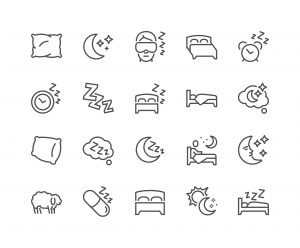Not sleeping well? Avoid these 5 things!
by Haley Cooke | November, 3, 2021
Without a Doubt, Nutrition and Quality Sleep Are Linked
If you’re struggling to turn your brain off and settle in for a good night’s sleep, start first by looking at your diet. You may be surprised that a few simple tweaks can help you fall into a deeper sleep. Here are some foods and drinks to avoid if you want to get a good night’s sleep:
Alcohol
Alcohol is a CNS stimulant that slows down your body to cause feelings of relaxation and sleepiness. The problem, though, is that alcohol can create shorter sleep cycles and imbalance your overall sleep experience. Try avoiding alcohol on the weekdays and take notice to how much energy you wake up with.
Caffeine
Caffeine is known to cause a spike in the body 30 to 60 minutes after consumption and stimulates the body up to six hours later. So that afternoon caffeine is still keeping your body humming when your mind is ready to shut down for the evening. Caffeine ingestion is known to reduce sleep time and can potentially cause fatigue, memory retention issues, and struggles with emotion regulation. Try stopping your caffeine hours before bed to get an uninterrupted night of sleep.
Fat-Filled Foods
I am sure you have heard this before but…. dinner should be a smaller lighter meal. As your body gets ready for bed, digestion slows. As a result, food can stay in the stomach longer. This can potentially cause issues that will keep you awake and can make it uncomfortable to sleep. Work to eat balanced meals throughout the day so you’re not starving by the time dinner rolls around.
Salty Foods
Does your evening meal contain too much salt? An excess of salt increases your water retention and dehydrates your body. Both will cause you to feel tired and then feeling dehydrated may cause you to wake up with headaches. Try to avoid salt several hours before bedtime.
Sugary Goodies
It’s a known fact that too much sugar isn’t good for your health, but did you know it can also have a major impact on y our sleep too? It’s not just your evening treat of ice cream, either. If your overall diet includes lots of sugar (fruits, processed foods, sugary snacks, etc.), you are probably in for more sleepless nights. Consider cutting sugar intake off in the early afternoon to help avoid sleep interruptions.
our sleep too? It’s not just your evening treat of ice cream, either. If your overall diet includes lots of sugar (fruits, processed foods, sugary snacks, etc.), you are probably in for more sleepless nights. Consider cutting sugar intake off in the early afternoon to help avoid sleep interruptions.
A few other nutritional tips for great sleep:
Don’t eat too late – Eating close to bed can make it hard to get comfortable when you have a full stomach. It can also cause acid reflux issues, which may cause you to cough and wake you up.
Watch your portions – See how a lighter meal in the evenings makes you feel. You’ll want to ensure you still have protein to stay full. Using a smaller plate can help you work on your portion control, too.






This is really insightful! I appreciate how you explained each thing thoroughly. I definitely will stop eating so late at night hopefully it improves my quality of sleep!